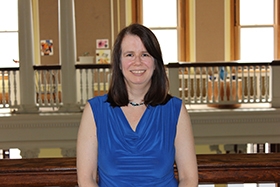
Kelly Butler, Ph.D., associate professor of chemistry, was recently named a Fulbright scholar and will return to India in July 2015 for nine months to lead faculty development workshops on the Process Oriented Guided Inquiry Learning (POGIL) teaching method for the 2015-2016 academic year.
POGIL has been around in the U.S. for more than 20 years and was originally instituted in chemistry classrooms. It’s a program Dr. Butler’s been using in her classes for 10 of the 12 years she’s taught at the College and uses it in nearly every class she teaches. POGIL is a student-centered strategy where students work in small groups and each student has an individual role within the group. Having students work in small groups is successful because it keeps all students engaged in the learning process at the same time. The process also helps students develop various skills such as critical thinking, problem solving and the application of knowledge.
“Most students do not learn well from lectures and do not gain the skills they need to be successful in their careers and in their lives,” said Dr. Butler. “It helps students to develop skills such as teamwork, management and communication through team-based learning.”
Aside from the United States, the POGIL system is used in countries such as Australia, Canada, Qatar and some areas in India, where Dr. Butler worked with officials during the summer of 2013.
Dr. Butler first met her professional contacts in India at the 2008 International Conference on Chemical Education (ICCE) in Mauritius. Conference participants were very interested in the POGIL work Dr. Butler was doing and wanted to learn more. Dr. Butler kept in touch with her colleagues and later crossed paths again at the 2010 Biennial Conference on Chemical Education in Texas.
Both the VNR Vignana Jyothi Institute of Engineering and Technology (VJIET) and the VNR Vignana Jyothi Institute of Management (VJIM) in Hyderabad, decided to start using POGIL methods in 2013 and during the summer of 2013, Dr. Butler was one of three U.S. educators selected to go to Hyderabad to train and consult with VNR VJIET and VJIM faculty to implement the POGIL activities. In July of this year, Dr. Butler will travel back to these places to do further faculty development and POGIL work.
“Having a person with a lot of experience in writing and implementing POGIL activities, teaching and consulting at VJIET and VJIM for an academic year will have a much more significant and longer-lasting impact on the curriculum and pedagogy than did our month-long visit. I am eager to help VJIET and VJIM become more solidly grounded in the POGIL pedagogy,” said Dr. Butler.
While in India, Dr. Butler will teach at least one chemistry-related course and provide one-to-two POGIL workshops a week on a variety of topics geared to enhance the faculty’s ability to write POGIL activities and facilitate them with their own classes.
Dr. Butler will face some challenges in India such as cultural differences and in the classroom with restrictions placed on the use of paper and photocopying.
“One way to adjust the activities is to put much more on PowerPoint slides and less on handouts,” said Dr. Butler. “Because of the differences in U.S. and Indian English, the language in activities also needs to be simplified and idioms and slang must be taken out.”
Dr. Butler also said she’ll need to remember how she frames questions and to slow down her speech so people can understand each other better.
“When I ask people if they have any questions, Indians are not likely to answer. However, when I ask people if they have doubts, I do get responses. As I understand the difference, doubts are something that reflects on the person who has them whereas questions reflect on the one who is being asked (so that asking me a question is actually questioning my ability but having a doubt does not),” said Dr. Butler.
Dr. Butler remarked that she really looks forward to returning to India and welcomes the experiences it will bring.
“The wonderful part of getting to live in another country for a significant amount of time is that I will grow in ways that I cannot even imagine now. I am looking forward to collaborating with and learning from Indian educators in the fields of engineering, science, and business,” said Dr. Butler.
Dr. Butler also looks forward to the Indian food and getting to wear her Indian clothes again that include kurtas, salwar kameez and saris.







